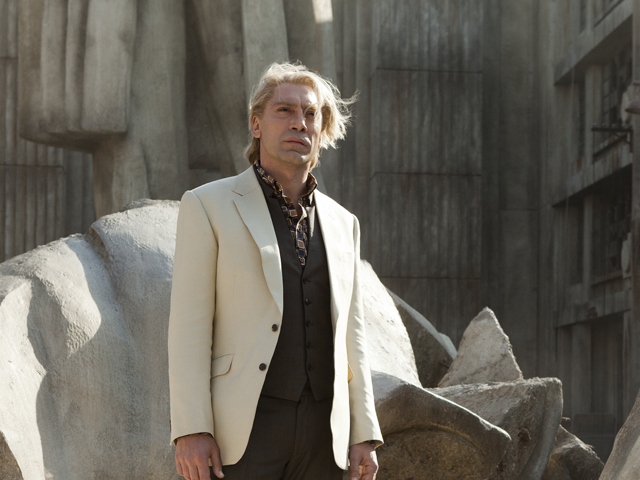“Sam [Mendes, the film’s director] and I really tried to bring the flavor of a classic villain combined with something more contemporary, from present times,” said Bardem of the decision to create a villain so utterly unique within the franchise’s 50-year history. “Together, we decided to create a character based on the idea of an ‘uncomfortableness’ that would be apparent from his physicality down to the way he acts.”
Bardem, an icon in his native Spain, is no stranger to playing the bad guy. After all, the 43-year-old won an Oscar in 2008 for his gripping role as a sociopath in “No Country for Old Men.” Why then, as the very first Hispanic actor to play a villain in the James Bond franchise, did he choose to base his character on such an abstract objective?
“Sam brought the idea to me and I really found it compelling,” explains Bardem. “Rather than creating menace, being threatening or scary, it was important that my character create uncomfortable situations – and do it with a sense of humor that could also be perceived as uncomfortable.”
Bardem’s Silva – a former MI6 agent whose thirst for revenge drives him to create the most intricate of plots to take down Bond (Daniel Craig) and M (Judi Dench) – does exactly that, even going so far as creating some homoerotic tension in a scene where he finally meets Bond face to face. So the question begs to be asked: is Silva – officially the baddest villain in all of James Bond history – gay?
“I think if people perceive that, they’re free to run with it – it’s part of the game and the joy of people interpreting the film differently,” says Bardem, whose first big hit was the Spanish comedy “Jamón, jamón” opposite now-wife Penelope Cruz. “That particular scene is all about creating something unexpected for Bond; it’s one aspect of my character but not the whole picture. It’s definitely one of the things I worked on and had a lot of fun with.”
It turns out that Bardem also had fun with creating his soon-to-be infamous look, complete with a particularly unflattering blonde wig.
“It was certainly a process,” admitted Bardem, who worked extensively with a makeup artist and hairdresser to create Silva’s creepy appearance. “Sam and I had many pictures and ideas as inspiration to start with. Little by little, we tried out a variety of things and then one day we got what we were looking for – that ‘uncomfortableness’ embodied in the physicality of the character.”
And while Bardem may have spent a considerable amount of time shaping his masterful villain’s character, he confessed that there’s one aspect of his role he didn’t have utter control of: Silva’s impressive action scenes.
“It’s nothing compared to Daniel [Craig],” chuckled Bardem. “I got a glimpse of it and it’s there because if you’re going to a James Bond film you want that element – but let’s just say that I’m a great believer in a stunt double’s work!”
While most of the attention on Silva’s character is bound to be on his evil nature, Bardem says there’s one aspect of his character he really appreciated: Silva’s practice of meditation during particularly tense moments.
“We aren’t machines – we’re all people who carry different things with us,” reflects Bardem. “We have to remind ourselves to breathe, close our eyes and connect with the importance of the situation.”
And can audiences expect to see more of Bardem as the bad guy in future films? That’s always a possibility, says Bardem, who says he enjoys the process of finding material that “triggers the imagination.”
“It’s not easy to find material that can take you to a place where you’re forced to bring something to the table,” says Bardem, who just wrapped up “The Counselor,” a drama co-starring wife Cruz and directed by friend Ridley Scott. “It doesn’t depend on one’s self or a particular project – it lies in the possibility of making that choice.”
In any case, fans will soon see the softer side of Bardem in his next project: a documentary titled “Sons of the Clouds,” which will be released Nov. 13 on iTunes and other VOD platforms. It’s a film slated to shed light on the plight of Western Sahara natives whose homeland was subject to Moroccan invasion and subsequently subjected to Moroccan rule without democratic representation.
“I hope people find the story of this crisis as interesting as I did, having spent four years of my life working on it,” says Bardem.
“It’s a social, humanitarian issue with a bad history that deserves attention.” by Nina Terrero [NBC]


